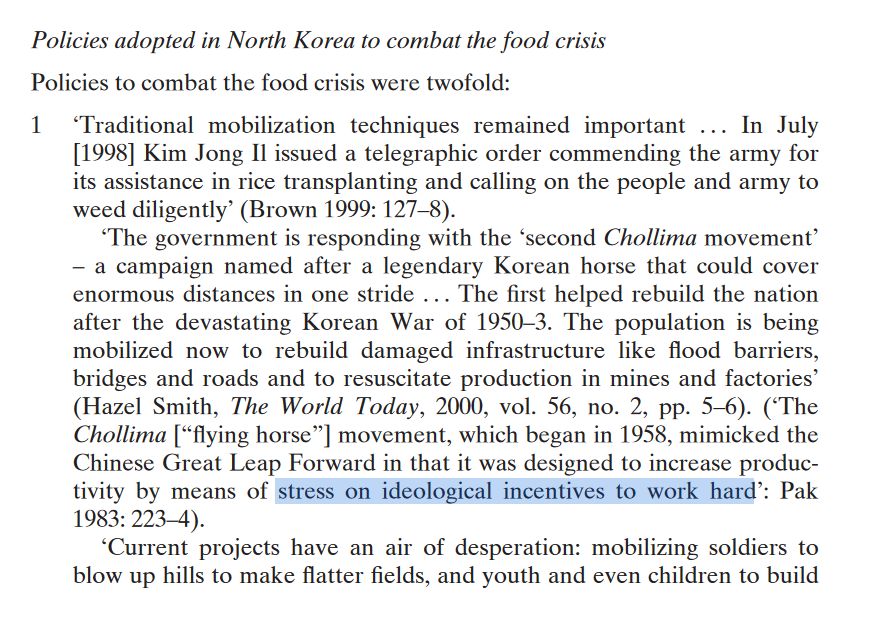https://en.wikipedia.org/wiki/Chollima_Movement
Citation #2 points to a book that collates many sources. Here's what it has to say:
Show


Wikipedia is just a collection of opinions laundered by loosely-relevant citations appearing next to them (or in this case, completely irrelevant ones).


The article is peppered with kernels of divine knowledge such as "The Kim Il Sung-directed economy undoubtedly needed alterations. Kim Il Sung however, had no economists who were willing or able to tell him that his economic plans needed to be changed."
The citation this time is by an author from the RAND corporation and the Institute for Defense Analyses, whose parents fled from the north in 1945.
vuvuzela no economists.
A friend of mine who works in DC suggested that if I wanted to really learn about the conflict in Korea, I should pick up a copy of Andrei Lankov's The Real North Korea: Life and Politics in the Failed Stalinist Utopia. I'm leafing through the first couple of chapters, and I mention "Hey, it looks like he just breezes over the Bodo League massacre as the inciting incident of the war, what gives?" My DC friend had never heard of the Bodo League, the slaughter of around 200,000 Korean dissidents, or the response from the North.
As I pick further into the book, I note similar historical skips and stumbles. As I'm raising these points, I get more and more push back, because I'm supposed to be learning about the conflict not teaching it. That ends up being the end of our discussion on the topic.
How dare you already know more on the topic than the one book I read that told me dprk evil no food
shrug
This is where every leftist/liberal conversation tends to break down. At some point, you're going to say "Yeah, but what about..." or dismiss a source as nakedly embellished/untrue. And then the real argument devolves into "Who do you trust to do the leg work on primary sources?"
That's where the real divide emerges.
It pretty much always comes down to this, and because of the century of red scare that preceded us we are always on the disadvantaged side regarding the amount of good truthful sources that are in a language you can understand.
They can always pull the "goverment lies" card but when we do they scuff at us because we're apparently mindwashed by the USSR or some local communist org
Do you have a soviet/communist source I could read that frames it this way? I'm struggling to find something like this.
I think Blowback Season 3 gets into it. They cover the war end-to-end. I can't even remember what podcast went into it first... TrueAnon or maybe Lions Led by Donkeys... The Dollup?
It was so long ago, I honestly can't recall.
Lankov is very lib, but he wasn't yet caught at lying, just omission and selective emphasis, which is better than most liberal historians. Among Russian specialists on Korea Asmolov is the better one.
Also, Lankov currently works in South Korean university, so it additionally distorts the picture.
I don't know about straight up lying, but at any point in which the historical record was slightly murky - most notably, in the early chapters, when there is some confusion as to whether Kim Sung Il or Stalin is calling the shots - Lankov consistently reaches for conclusions that belittle the Koreans and question their capacity for anything but cruelty.
The pitch I got was "He's a former Soviet, so he's not coming at Korea with a Western bias".
But Ayn Rand was also a former Soviet.